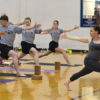Yoga Faqs – Frequently Asked Questions
Your curiosity and interest in Wellness Haven Yoga is very much appreciated, and I hope you will be able to find the answers to all your questions. If you have any further questions, please do not hesitate to reach us via phone or using our contact form.
To fully understand what yoga is all about, how it is taught at Wellness Haven and what it can do for you, please come and watch a session in progress from beginning to the end or simply attend a class!
What actually is Yoga?
The word “Yoga” in Sanskrit (the language of ancient India – where yoga originated) is defined as “UNION.” Yoga is the true union of mind, body and spirit. In today’s language, the word yoga is commonly used to describe the physical postures or poses (Sanskrit word “asana”), but posture or asana is only one of the eight limbs of yoga. The critical aspect of yoga is to bring ones attention inwards (the spiritual aspect of yoga) – which in turn is critical to one’s well being.
What Are The Eight limbs of Yoga?
1. Yama: The 1st limb constitutes the 5 ethical guidelines for moral behavior towards others.
Ahimsa: Nonviolence
Satya: Truthfulness
Asteya: Non stealing
Brahmacharya: Non-lust
Aparigraha: Non-covetousness
2. Niyama: The 2nd limb constitutes the 5 guidelines for moral behavior towards oneself:
Saucha: Cleanliness
Santosa: Contenmtment
Tapas: Sustained practice
Svadhaya: Self Study
Isvara pranidhana: Surrender to God
3. Asana: The 3rd limb is the practice of yoga postures.
4. Pranayama: The 4th limb is the practice of controlled breathing exercises.
5. Pratyahara: The 5th limb is the practice of withdrawal of the senses, the practice of going inwards.
6. Dharana: The 6th limb is the practice of concentration, the ability to focus without distractions from the outside world.
7. Dhyana: The 7th limb is the practice of meditation. Meditation is a holistic discipline through which the practitioner attempts to get beyond the reflexive, “thinking” mind into a deeper state awareness.
8. Samadhi: The 8th limb of yoga is the state of bliss, the enlightened state, where the Self transcends through meditation.
Why is a yoga class environment recommended?
Learning from a Certified instructor provides a safe, structured, scheduled, disciplined, and a committed environment for joyful learning. In addition it allows you to stay focused on your postures, breathing, relaxation where you never have to worry about which postures to do, in what sequence, or for how long. You have the ability to ask a question at any time, even during the instruction or more questions after class! Finally group classes provide an energetic, congenial support system where motivation comes from the teacher as well as the students around you. You realize that you are not alone!
When does the session begin? When can I start my first yoga class?
Yoga sessions are ongoing 7 days a week. You can start your first class the day you are ready to begin! There is no need to wait for a session, for you will start learning your very first day.
Do I need to have done yoga before joining your class? In other words, do I have to have yoga experience before joining the class?
No prior yoga experience is required to start practicing yoga. We teach you the A, B, C’s…of yoga. You’ll go from your current level to the next level and beyond, as a beginner or an advanced student. We teach you all about the practice – postures, alignment, breathing techniques, and terminologies, as well as take you through visualization exercises and meditative techniques. Remember, Yoga is a journey, not a destination.
Do I have to be a certain weight to comfortably perform yoga effectively?
You can be of any body type and weight to do yoga, for it is about gaining balance, flexibility, stamina and endurance.
Is your yoga class strenuous or more meditative? I have done yoga before I’m looking for more intermediate to advanced poses. Do you cover these in your class?
We teach yoga 7 days a week at Wellness Haven Yoga Studio. Each class is geared to serve students in their own level – from Complete Beginner to Advanced. We have separate specialized classes for meditation/pranayama (breathing)/mudras and bandhas as well.
Do you have to purchase a mat for successful techniques or can you just use a towel to lie on?
We provide mats at our studio for your use, but we recommend that you do bring your own personal mat for hygiene purposes. We recommend a good quality mat for the practice since this is your sacred space to keep your body healthy and happy. We buy our mats from huggermugger.com since they are quality, hypoallergenic mats that are 1/4 inch thick and non-dry, with non-slip surface that do not fold with each move and suitable for a safe practice.If you need any help choosing the mat, please do not hesitate to ask.
How often should I come to the yoga class?
We recommend that you attend classes 3 times a week, and minimum 2 per week. Of course when you cannot, you stretch on your own. Consistent stretching is what one needs to stay healthy without tight muscles and ligaments. Ideally, yoga is recommended 7 days a week – in the class and on your own
How soon will I start getting benefit from yoga?
Wellness Haven students start seeing a difference when they do a consistent yoga practice within a month! In 3 months, the feeling of “wow!” sets in; within 6 months, others are able to see a difference in you! I always treasure the “aha” moments of my students – when they are able to raise their shins parallel to the floor, when they suddenly can do a full wheel or a crow pose, when they can do a good pushup or when they are able to raise their legs to different heights off the floor when in a supine pose, but mostly when they start feeling a sense of well being in their mind and body.
How long should I wait after eating to do yoga? How long after the practice can I eat?
It depends on what food you have eaten, since the digestion time for each food type is different.
In general:
Meat: 2-3 hours.
Carbs, starches: 1 1/2 – 2 1/2 hours.
Fruits and Veggies: 1/2 – 1 hour.
In general, the stomach should be empty, since food in the stomach can reduce range of motion and energy level, affecting your strength, stamina and your ability to focus. After the practice, the time it takes you to come out of the practice, fold your mat, put it away, change attire etc. is enough time to spend before you can start eating!
Again you are your own body’s best judge. Listen to your body.
How long should I continue with the class?
You continue with yoga because you care about yourself. Yoga is for life and provides you the benefits day in and day out. Make it a part of your daily routine, whether you are in class or by yourself. It allows one to lead a life without tension and stress. It allows one to not have to make frequent doctor visits!
Will I get hurt doing yoga?
Not if you do it right. Yoga, when done under a certified, experienced teacher in a safe environment and with proper yoga mats and accessories, provides a sense of well being and not pain. There is a difference between pain and soreness. Pain is when you take your body beyond what it is ready to do, or do a pose incorrectly. Soreness is what you feel when you challenge your body parts.
If you have back pain, can you still do yoga?
Absolutely, in fact it is highly recommended. We have poses especially for relieving pain in various parts of the body. Always check with your doctor first.
Do you do any specialty programs like for Hypertension etc.? I am mostly looking for reducing hypertension and trying to see if we can do BP related yoga asanas/exercises?
Human diseases/surgeries etc are all the areas yoga can improve. Of course, you will need to consult with your doctor first. What I teach is all inclusive – there are certain things that a BP patient should avoid, and certain breathing practices that they should incorporate in their daily life. I ask you to fill out a student form before your first class so that I know where you are in your health, and mention things accordingly during the practice.
If a person has had several low back surgeries & knee problem can they benefit from Yoga? And how can they benefit?
My first question to you when you have had injuries, surgeries is: Have you consulted your doctor regarding Yoga? Has your doctor given you the green signal? If the answer to both questions is “yes,” then you will benefit tremendously from yoga. Restorative yoga practice, with gentle postures, help in strengthening the muscles weakened by surgery and body ailments. I ask you to fill out a student form before your first class so that I know where you are in your health, and mention things accordingly during the practice.
In what cases (health issues) yoga is not recommended?
In general the right kind of yoga, after your doctor has advised you to exercise, proves to be extremely beneficial for the injured and physical ailments, but the key word is right kind, and that is Restorative Yoga poses, rather than energetic poses. I ask you to fill out a student form before your first class so that I know where you are in your health, and mention things accordingly during the practice.
What to avoid:
During Pregnancy: Since ligaments are softened during pregnancy and become vulnerable to overstretching, avoid bends (full wheel) twists, abdominal work (boat poses), inversions (that compress the internal organs), lying on belly (cobra), lying on back for extended periods. Also any form of hot yoga should be avoided. (Also avoided during periods, and by nursing mothers).
Multiple Sclerosis: Hot yoga is avoided.
Slip Disc: Sarvanga Asana/Shoulder Stand is avoided.
Heart conditions: shoulder stand is avoided.
Connective tissue (ligament/muscle tears) injuries – Rest is recommended rather than stretching further which will not allow it to heal.
Arthritis: Always consult your doctor first. Yoga proves to be good for arthritis, since it keeps the joints limber and lubricated with healing white blood cells but avoid over-stretching, since that will counter-act the goodness of yoga.
Carpal tunnel syndrome, if you are suffering from a recent or chronic injury to the back, hips, arms or shoulders, Sciatica, Nerve pains shooting down limbs, back injuries like bulging or herniated discs – Consult with your doctor and avoid any stretch that strain your injured body parts.
In general ask your doctor first. Let your body be your guide. Do not overstretch/overdo, even if it feels good. Pay attention to the signals given by your body, for you are your best guide. Allow the mind-body connection and stay in tune with what your body is trying to tell you.
Your body is your temple given to you by The Higher Power. Worship it.
How much do yoga sessions cost?
Please check: https://www.wellnesshaven.com/wellness-haven-packages/.






